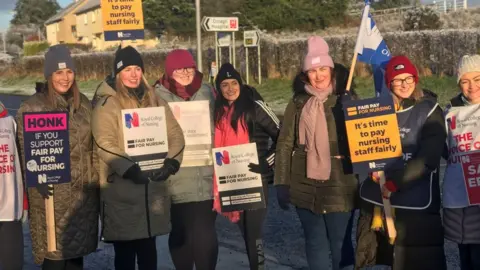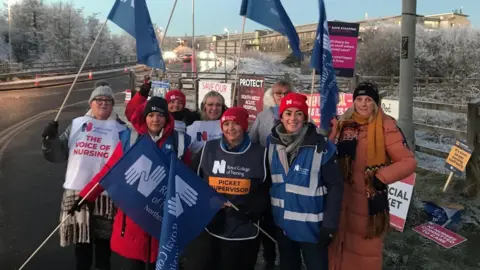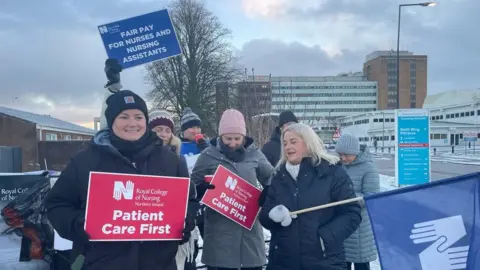Nurses' strike: Services affected as staff stage 12-hour walkout
Nurses across Northern Ireland having joined colleagues in England and Wales in the largest NHS strike in its history.
The 12-hour strike began at 08:00 GMT, with nurses across Northern Ireland coming out in force.
A number of non-emergency care services were disrupted and outpatient appointments postponed.
Emergency care was still provided, as under trade union laws life-preserving care must remain.
A further day of strike action is also planned for Tuesday, 20 December.
The Royal College of Nursing (RCN), a trade union that represents almost 500,000 nurses across the UK, said staff had been given no choice but to take strike action after ministers refused to reopen pay talks.
The UK government has said the RCN's demand for a 19% pay rise - or a raise 5% above RPI inflation - was unaffordable.
'We did not create waiting lists'
This was the second time in three years that nurses in Northern Ireland took to the picket line to appeal for safe staffing and fair pay.
Denise Kelly, a nurse of 30 years who is also the national chair of the RCN trade union committee, was striking outside of Antrim Area Hospital - she told BBC's Good Morning Ulster programme that the strike was about patient safety, because the NHS cannot attract enough staff into nursing.
There are nearly 3,000 nursing vacancies in Northern Ireland.
"We're under pressure, services are compromised each and every day. We know that Northern Ireland had the highest waiting lists in the whole of the United Kingdom," she added.

"This is why we're here today, we're wanting to do something about that."
She said she believed nurses had public support, despite the disruption for patients.
"The health secretary - they are flagging up patients' appointments being cancelled today - nurses did not create these waiting lists, we did not create these pressures.
"We're here to advocate and fight for [patients] as well," she said.

On the picket line outside Altnagelvin Hospital in Londonderry, Laura McClintock said nurses had to strike to "advocate for patient care".
"No nurse enters the profession expecting to be rich but things at the moment are so desperate, we are haemorrhaging staff.
"I love my job, love my patients, but what I see is people are struggling, nurses are struggling."

Ursula Barrett, who works in the emergency department (ED) at the South West Acute Hospital (SWAH) in Enniskillen, also said nurses were concerned about providing a safe service.
"Every ED, every ward, there's breaches, there are no beds, there's no patients being able to be discharged to create beds.
"I could be one of those patients or any of our relatives could be one of those patients," she said.
BBC News NI south west reporter Julian Fowler said staff at SWAH were dealing with freezing temperatures on the picket line.


Rush-hour drivers in Belfast sounded their horns in support as they drove past the City Hospital, where nurses have a picket line beside a busy commuter road.
Although this is the first ever UK-wide RCN walkout, members of the union here in Northern Ireland have gone on strike before.
On a similarly cold a December day in 2019, they took to the picket lines over similar issues.
Back then, as now, there was no devolved government due to a crisis at Stormont.
The previous strike was regarded as a catalyst for ending the political impasse after three years.
While pay negotiations are carried out nationally, the devolved government generally pays out the salaries.
The power vacuum in Northern Ireland adds more difficulties - and many would say, causes more frustration - in this dispute.

He said drivers had been sounding their horns in support despite disruption to services.
Across the Western Trust, which operates SWAH, 587 outpatient appointments were postponed because of the strike.
Eight planned inpatient and day case procedures were also cancelled.
Eleven GP practice treatment rooms, which are managed by the trust, remained closed on Thursday and community nursing services were reduced.
Why did the strike happen?
The RCN said it was campaigning for a pay rise of 5% above the RPI inflation rate to overcome real-terms pay cuts, which, it said, has left nurses 20% worse off since 2010.
Prior to the strike, in a statement, the Department of Health said fragile services would inevitably be further impaired by the strike and that the reality is there are no quick and simple solutions to the pressures facing the health service.
The nurses' strike came three days after health sector workers from three of Northern Ireland's biggest unions held a 24-hour strike over pay and conditions.
On Monday, pay talks between Health Secretary Steve Barclay and Pat Cullen, the head of the RCN, failed.
Ms Cullen said the health secretary refused to discuss pay in their meeting and therefore strikes would go ahead as planned on 15 and 20 December.
A spokesperson said the health secretary told Ms Cullen that any further pay increase would mean taking money away from front line services and tackling the post-Covid backlog.
The RCN said its pay demands follow years of squeezes on nurses' salaries, which have not kept up with the rising cost of living.
How do patients feel?
Some patients at Antrim Area Hospital, whose appointments were not cancelled on Thursday, voiced their support for the strike on BBC News NI's Evening Extra programme.
One patient stated that nurses needed to be rewarded for getting the general public through the pandemic.
"I am a carer for my son, if my son had of become really seriously ill with Covid it's those people in there that would have saved his life," she said.
"The MPs can get their pay rise so why can't the nurses? They deserve every penny of it."
Another said: "They're not paid enough for what they do, that's my own view.
"I have been attending this hospital the last two years and the care I've got has been second to none."
Most of those who spoke to the programme stated that they still would have supported the strike even if their appointments had been cancelled.
However, not all patients supported the action taken by nurses despite agreeing that they deserved a better wage.
"I support them to a certain extent but I feel that matters will only get worse, I feel for them but I feel for patients too ," one patient said.
"We need a solution, what it is I don't know but I don't really agree with striking, not for nurses."

How were services affected?
Western Trust
- Outpatient appointments, including urgent ones, postponed
- Inpatient and day case procedures cancelled
- GP practice treatment rooms closed
Southern Trust
- Phone First service not operating - reopens on Friday
- Minor injuries service closed at South Tyrone Hospital - reopens on Friday
- Day cases, outpatient and inpatient appointments cancelled
South Eastern Trust
- Majority of outpatient and diagnostic appointments postponed, as well as a majority of elective surgery procedures
- Minor Injuries Unit in the Ards Hospital closed and reopens on Friday
- Emergency surgery continued and the Chemotherapy and Renal Dialysis Units stayed open
Northern Trust
- Outpatient appointments including ENT, general surgery and day case procedures postponed
- Mental health services and school flu vaccination service affected
- Some GP treatments room closed and others operated a reduced service
Belfast Trust
The Belfast Trust said there was disruption to services and that they were working collectively to try and minimise the impact on their service users
